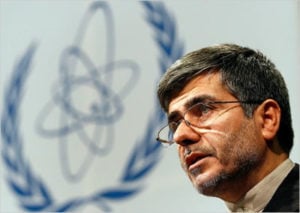 The New York Times reported on Saturday that Iran is stepping up its enrichment efforts, and that the man in charge is Fereydoon Abbasi, who narrowly escaped assassination along with his wife eight months ago. Abbasi, a nuclear physicist and member of the Revolutionary Guards, which manages Iran’s nuclear program, is in charge of the country’s enrichment efforts. He helped stabilize Natanz after the Stuxnet infection, according to the Times, and now “is spearheading the expansion of Iran’s enrichment program into underground halls.”
The New York Times reported on Saturday that Iran is stepping up its enrichment efforts, and that the man in charge is Fereydoon Abbasi, who narrowly escaped assassination along with his wife eight months ago. Abbasi, a nuclear physicist and member of the Revolutionary Guards, which manages Iran’s nuclear program, is in charge of the country’s enrichment efforts. He helped stabilize Natanz after the Stuxnet infection, according to the Times, and now “is spearheading the expansion of Iran’s enrichment program into underground halls.”
The attempt on Abbasi’s life was one of two such attacks last Nov. 29; the assassination of a second nuclear official was successful. In light of that, one may safely assume that Abbasi has been more highly motivated than ever, which raises questions about whether murder is a sensible way of trying to change an adversary’s behavior for the better, whatever its morality and legality. Iran has announced its intention of boosting the level of uranium enrichment to 20 percent, which will get it significantly closer to bomb-grade, and though its purposes are supposedly peaceful, new centrifuges are expected to be installed at its new hardened facility near Qom.
Meanwhile, the Financial Times reported in a big front-page article yesterday that Iran and China are seeking creative ways of continuing trade, in the face of global sanctions that make it virtually impossible to pay bills in dollars or other hard currencies. The two countries are reportedly discussing barter arrangements, mainly so that China can continue to import large volumes of Iranian oil and export a wide range of highly desired products to Iran. India is in a similar position with respect to oil imports but does not appear to have good barter options, because it exports little to Iran. China, in contrast, “is dominant in Iranian business” and is “involved in everything from building tunnels to exporting toys.” Bilateral trade between the two countries was almost $30 billion last year.
China may owe Iran as much as $30 billion for past oil purchases, according to the FT, and “some Iranian officials are growing increasingly angry about the inability of the country’s largest oil customers to pay cash, a problem that has contributed to a shortage of hard currency and has hindered the central bank from defending the Iranian rial, which has been sharply devalued over the last month.”